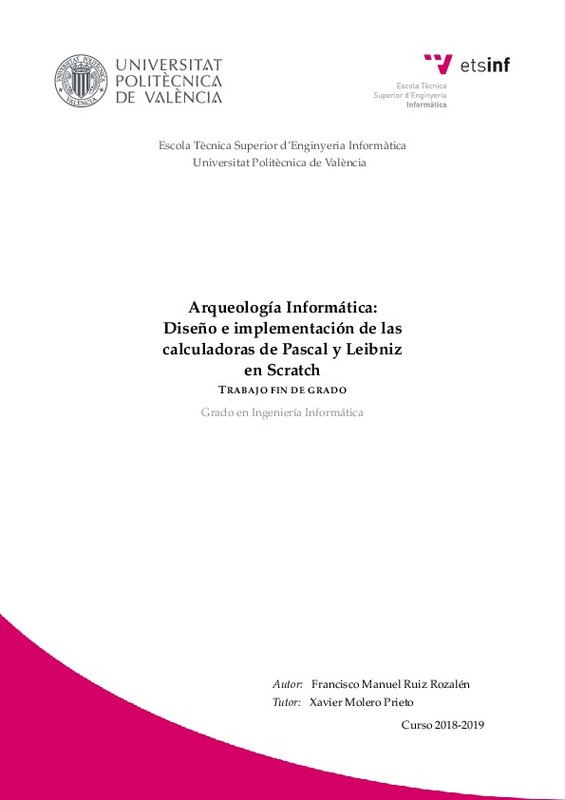JavaScript is disabled for your browser. Some features of this site may not work without it.
Buscar en RiuNet
Listar
Mi cuenta
Estadísticas
Ayuda RiuNet
Admin. UPV
Arqueología informática: Diseño e implementación de las calculadoras de Pascal y Leibniz en Scratch
Mostrar el registro sencillo del ítem
Ficheros en el ítem
| dc.contributor.advisor | Molero Prieto, Xavier
|
es_ES |
| dc.contributor.author | Ruiz Rozalén, Francisco Manuel
|
es_ES |
| dc.coverage.spatial | east=-0.3480557000000317; north=39.48279220000001; name=Universitat Politècnica de València, Museu d'Informàtica, Passatge Amparo Rivelles, 46022, Valencia, Espanya | es_ES |
| dc.date.accessioned | 2019-10-04T08:59:57Z | |
| dc.date.available | 2019-10-04T08:59:57Z | |
| dc.date.created | 2019-09-18 | |
| dc.date.issued | 2019-10-04 | es_ES |
| dc.identifier.uri | http://hdl.handle.net/10251/127234 | |
| dc.description.abstract | [ES] Haciendo uso de la herramienta creada por el M.I.T. para programar sin código llamada Scratch, crearemos emuladores para las calculadoras «pascalina» inventada por Blaise Pascal, capaz de realizar sumas y restas junto con la «Máquina universal» de Gottfriend Leibniz que realizaba las cuatro operaciones basicas. La finalidad de los mismos es la de hacer difusión de este patrimonio considerado como el ancestro de los computadores. Para la realización de estos emuladores, nos sumergiremos en la historia del componente mas básico de una calculadora, los números. Analizaremos en sus usos y evoluciones a lo largo de la historia y como estos provocaron la invención de las primeras calculadoras. Buscando el conocer los motivos que impulsaron a estos genios científicos a crear sus máquinas, estudiaremos sus vidas y obras, así como la sociedad del Siglo XVII, considerado el siglo de la revolución científica. Como complemento a los conocimientos adquiridos en el estudio de las obras de Pascal y Leibniz, también indagaremos en la vida y obra de otras personalidades que aportaron sus propios conocimientos e inventos a la humanidad también en el Siglo XVII. | es_ES |
| dc.description.abstract | [CA] Fent ús de l’eina creada pel M.I.T. per a programar sense codi anomenada Scratch, crearem emuladors per a les calculadores «pascalina» inventada per Blaise Pascal, capaç de realitzar sumes i restes juntament amb la «Màquina universal» de Gottfriend Leibniz que realitzava les quatre operacions bàsiques. La finalitat dels mateixos és la de fer difusió d’aquest patrimoni considerat com l’ancestre dels computadors. Per a la realització d’aquests emuladors, ens submergirem en la història del component mes bàsic d’una calculadora, els números. Analitzarem en els seus usos i evolucions al llarg de l’història i com aquests van provocar la invenció de les primeres calculadores. Buscant el conéixer els motius que van impulsar a aquests genis científics a crear les seues màquines, estudiarem les seues vides i obres, així com la societat del Segle XVII, considerat el segle de la revolució científica. Com a complement als coneixements adquirits en l’estudi de les obres de Pascal i Leibniz, també indagarem en la vida i obra d’altres personalitats que van aportar els seus propis coneixements i invents a la humanitat també en el Segle XVII. | es_ES |
| dc.description.abstract | [EN] Making use of the tool created by the M.I.T. in order to program without code called Scratch, we will create emulators for the «pascaline» calculator invented by Blaise Pascal, capable of performing addition and subtraction together with the « universal machine » of Gottfriend Leibniz that performed the four basic operations. The purpose of these emulators is to disseminate this heritage considered as the ancestor of computers. For the realization of these emulators, we will immerse ourselves in the history of the most basic component of a calculator, the numbers. We will analyze their uses and evolutions throughout history and how they caused the invention of the first calculators. Seeking to know the reasons that drove these scientific geniuses to create their machines, we will study their lives and works, as well as the society of the 17th century, considered the century of the scientific revolution. As a complement to the knowledge acquired in the study of the works of Pascal and Leibniz, we will also investigate the life and work of other personalities who contributed with their own knowledge and inventions to humanity also in the 17th century | es_ES |
| dc.format.extent | 74 | es_ES |
| dc.language | Español | es_ES |
| dc.publisher | Universitat Politècnica de València | es_ES |
| dc.rights | Reconocimiento (by) | es_ES |
| dc.subject | Scratch | es_ES |
| dc.subject | Blaise Pascal | es_ES |
| dc.subject | Gottfried Leibniz | es_ES |
| dc.subject | Calculadora | es_ES |
| dc.subject | Números | es_ES |
| dc.subject | Siglo XVII | es_ES |
| dc.subject | Calculator | es_ES |
| dc.subject | Numbers | es_ES |
| dc.subject | 17th Century | es_ES |
| dc.subject.classification | ARQUITECTURA Y TECNOLOGIA DE COMPUTADORES | es_ES |
| dc.subject.other | Grado en Ingeniería Informática-Grau en Enginyeria Informàtica | es_ES |
| dc.title | Arqueología informática: Diseño e implementación de las calculadoras de Pascal y Leibniz en Scratch | es_ES |
| dc.type | Proyecto/Trabajo fin de carrera/grado | es_ES |
| dc.rights.accessRights | Abierto | es_ES |
| dc.contributor.affiliation | Universitat Politècnica de València. Departamento de Informática de Sistemas y Computadores - Departament d'Informàtica de Sistemes i Computadors | es_ES |
| dc.contributor.affiliation | Universitat Politècnica de València. Escola Tècnica Superior d'Enginyeria Informàtica | es_ES |
| dc.description.bibliographicCitation | Ruiz Rozalén, FM. (2019). Arqueología informática: Diseño e implementación de las calculadoras de Pascal y Leibniz en Scratch. http://hdl.handle.net/10251/127234 | es_ES |
| dc.description.accrualMethod | TFGM | es_ES |
| dc.relation.pasarela | TFGM\95454 | es_ES |
Este ítem aparece en la(s) siguiente(s) colección(ones)
-
ETSINF - Trabajos académicos [5160]
Escola Tècnica Superior d'Enginyeria Informàtica






